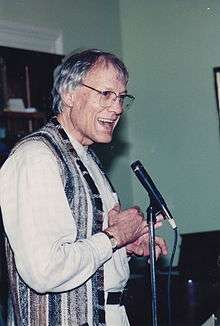Walter Wink
| Walter Wink | |
|---|---|
 Walter Wink preaching. From the Fellowship of Reconciliation archives. | |
| Born |
May 21, 1935 Dallas, Texas, United States[1] |
| Died |
May 10, 2012 (aged 76) Berkshire Mountains, Massachusetts, United States[1] |
| Occupation | minister, theologian, author |
| Language | English |
| Nationality | United States |
| Ethnicity | Caucasian |
| Citizenship | United States |
| Spouse | June Keener Wink[1] |
| Children | Rebecca Wink, Steve Wink, Chris Wink and Stepchildren: Kim Bergland, Kurt Bergland[1] |
| Website | |
|
www | |
Walter Wink (May 21, 1935 – May 10, 2012) was an American biblical scholar, theologian, and activist who was an important figure in Progressive Christianity. Wink spent much of his career teaching at Auburn Theological Seminary in New York City. He was well known for his advocacy of and work related to nonviolent resistance and his seminal works on "The Powers", Naming the Powers (1984), Unmasking the Powers (1986), Engaging the Powers (1992), When the Powers Fall (1998), and The Powers that Be (1999). He is also known for coining the phrase "the myth of redemptive violence".
Career
Wink earned a B.A. from Southern Methodist University in 1956, majoring in history, and minoring in philosophy and English. He completed his Master of Divinity in 1959 and his Ph.D. in 1963, both from Union Theological Seminary in New York City. Ordained as a Methodist minister in 1961, he served as Pastor of First United Methodist Church, in Hitchcock, Texas from 1962–67. He then returned to Union Seminary as an Assistant Professor of New Testament, then Associate Professor of New Testament, from 1967-1976. After being denied tenure at Union, he began teaching at Auburn Theological Seminary, remaining there until his death, when he was Professor Emeritus. His faculty discipline was Biblical interpretation. In 1989–1990, he was a Peace Fellow at the United States Institute of Peace.[2]
He was known for his work on power structures, his commentary on current political and cultural matters, and his contributions to the discourse on homosexuality and religion, pacifism, the relationship between psychology and biblical studies, and research related to the historical Jesus. Neal Stephenson likens some of Wink's ideas to "an epidemiology of power disorders", a phenomenology of oppression.[3] Author Philip Yancey references Wink frequently in his work.[4][5]
One of Wink's major avenues for teaching has been his leadership of workshops to church and other groups, based on his method of Bible study (The Bible in Human Transformation, 1973), and incorporating meditation, artwork, and movement. These workshops were often presented jointly with his wife, June Keener-Wink, a dancer and potter.
One of Walter Wink's sons—Chris Wink—is known as a founding member of the Blue Man Group.
Partial bibliography
- John the Baptist in the Gospel Tradition, Cambridge Univ. Press, 1968. (out of print)
- The Bible in Human Transformation, Philadelphia: Fortress Press, 1973. (out of print)
- The Powers Trilogy:
- Naming the Powers: The Language of Power in the New Testament, Philadelphia: Fortress Press, 1984. ISBN 0-8006-1786-X
- Unmasking the Powers: The Invisible Forces That Determine Human Existence, Philadelphia: Fortress Press, 1986. ISBN 0-8006-1902-1
- Engaging the Powers: Discernment and Resistance in a World of Domination, Minneapolis: Fortress Press, 1992. ISBN 0-8006-2646-X
- Violence and Nonviolence in South Africa, Philadelphia: New Society Publishers, 1987. (out of print)
- Transforming Bible Study, second edition, Nashville: Abingdon, 1990. (out of print)
- Proclamation 5: Holy Week, Year B, Minneapolis: Fortress Press, 1993. (out of print)
- Cracking the Gnostic Code: The Powers in Gnosticism, (Society of Biblical Literature Monograph Series), Atlanta: Scholars Press, 1993. ISBN 1-55540-860-5
- When the Powers Fall: Reconciliation in the Healing of Nations, Minneapolis: Fortress Press, 1998. ISBN 0-8006-3127-7; Swedish edition: Healing a Nation's Wounds: Reconciliation on the Road to Democracy (Uppsala, Sweden: Life and Peace Institute, 1997)
- The Powers That Be:Theology for a New Millennium, New York: Doubleday, 1999. ISBN 0-385-48752-5
- Homosexuality and Christian Faith: Questions of Conscience for the Churches (editor), Minneapolis: Fortress Press, 1999. ISBN 0-8006-3186-2
- Peace Is The Way: Writings on Nonviolence from the Fellowship of Reconciliation., (editor), Orbis Books, 2000. ISBN 1-57075-315-6
- John the Baptist in the Gospel Tradition, Wipf & Stock Publishers, 2001. ISBN 1-57910-529-7
- The Human Being: Jesus and the Enigma of the Son of the Man, Fortress Press, 2001. ISBN 0-8006-3262-1
- Jesus and Nonviolence: A Third Way, Augsburg Fortress, 2003. ISBN 0-8006-3609-0
- The System Belongs to God DVD, UMCom Productions, http://secure.umcom.org/Store/the-system-belongs-to-god.
References
- 1 2 3 4 Deats, Richard (May 2012). "Walter Wink, Presente!". Fellowship of Reconciliation. Retrieved 11 May 2012.
- ↑ Dr. Wink's Curriculum Vitae
- ↑ "Neal Stephenson's Past,Present, and Future". Retrieved 2008-09-09.
- ↑ "CSEC". Retrieved 2007-11-09.
- ↑ "Christianity Today". Retrieved 2007-11-09.
External links
- Personal website
- "Walter Wink, Presente!," obituary by Richard Deats, Fellowship of Reconciliation, 11 May 2012
- Review of The Human Being, by D. Seiple, Union Seminary Quarterly Review, Vol 55 (3-4), 2001, pp. 178-183